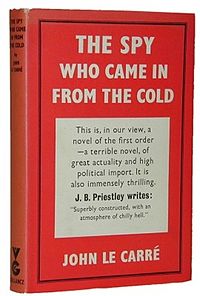When I think about the books that influenced my life, I have to think about the books that shaped my world view. As a child of the 1950’s, it would be great if I could see the world through the two dimensional lens that we so often associate with that era.
But I can’t. In part because I was born in December of 1958, far too young to experience that decade. By the time I was old enough to reason on my own we were being fed a nightly newscast of bad news from Vietnam, protests in the streets, and tragic assassinations. As a teenager I watched the drama of Watergate unfold.
These events, and more like them, shaped my world view. The rose colored glasses came off, though they were probably never on. When it came to national and world events, I was neither an optimist nor a pessimist. I became a pragmatist.
And that’s why the British espionage book The Spy Who Came in From the Cold by John le Carre is so important to me.
First, the lighter part of this. My brother recommended Spy to me when I was in college. I was hooked immediately, and began joking around that my alias name was Fred Smiley, George Smiley’s brother (George Smiley is the main character in the book). I quickly read through all the le Carre books and have continued to do so.
Written in 1963, The Spy Who Came In From The Cold is now recognized by Publishers Weekly as the greatest spy novel of all time. TIME put it on the list of top 100 novels. It launched le Carre’s career and spawned the modern spy novel (including all those Jason Bourne books/movies, which are essentially an American copy).
All well and good, you say. But why put it on your top 25 list?
A common theme of my top 25 books has been wrestling with moral dilemmas. What I sometimes call “living in the tension.” This book brilliantly illuminates just that tension. The espionage world is filled with moral ambiguity and confusion. It still is today as we see from things like drones killing American citizens overseas. Is that right? Is it wrong? Whatever side you take you have to admit it’s worthy of a conversation and contemplation.
What I found in these books, and in The Spy Who Came In From The Cold in particular, was the profound contest between our deep love for country and our moral limits. This was especially true during the Cold War. Defining our enemy was muddled, and knowing how to respond to a threat (which was a legitimate threat) was confusing. The book captures that.
There was no simple two dimensional way to view the world. Not even our enemies. Not even our own country. That shaped me and made me look at the world with a more nuanced eye, a natural caution, and an awareness that all was probably not how it seemed.
And for this reason The Spy Who Came In From The Cold makes my list of 25 books that influenced my life.
Want to read more of my top 25? Here is the list thus far:
Celebration of Discipline – #1
The Hobbit and The Lord of the Rings – #2
The Cost of Discipleship – #3
The Screwtape Letters – #4
Adventures of Huckleberry Finn – #5
Only the Paranoid Survive – #6
The Spy Who Came In From The Cold – #7
The Hitchhiker’s Guide to the Galaxy – #8
Truman – #9
Shantaram – #10
The Maltese Falcon – #11
The Shadow of the Wind – #12
Survey of the New Testament – #13
Calvin & Hobbes – #14
Celtic Daily Prayer – #15
Managing the Nonprofit Organization – #16
A Wrinkle in Time – #17
The Practice of the Presence of God – #18
Catch 22 – #19
The Tortilla Curtain – #20
The Kingdom of God is a Party – #21
Earthkeeping – #22
Reviving Ophelia – #23
The Grapes of Wrath – #24
Peanuts – #25


